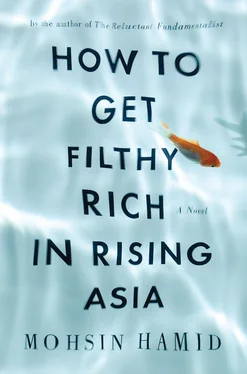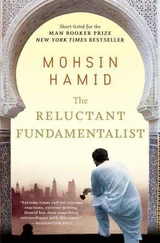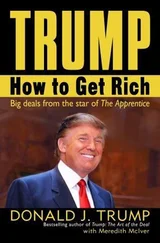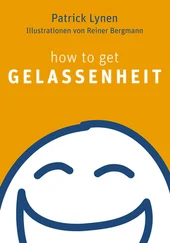It is perhaps not that night, but certainly that week, that you sit yourself down at a neighborhood roadside stall and ask a wrinkled old man with hennaed hair and a cutthroat razor finally to give you a shave.

TO BE EFFECTIVE, A SELF-HELP BOOK REQUIRES TWO things. First, the help it suggests should be helpful. Obviously. And second, without which the first is impossible, the self it’s trying to help should have some idea of what help is needed. For our collaboration to work, in other words, you must know yourself well enough to understand what you want and where you want to go. Self-help books are two-way streets, after all. Relationships. So be honest here, and ask yourself the following question. Is getting filthy rich still your goal above all goals, your be-all and end-all, the mist-shrouded high-altitude spawning pond to your inner salmon?
In your case, fortunately, it seems to be. Because you have spent the last few years taking the essential next step, learning from a master. Many skills, as every successful entrepreneur knows, cannot be taught in school. They require doing. Sometimes a lifetime of doing. And where moneymaking is concerned, nothing compresses the time frame needed to leap from my-shit-just-sits-there-until-it-rains poverty to which-of-my-toilets-shall-I-use affluence like an apprenticeship with someone who already has the angles all figured out.
The master at whose feet you metaphorically squat is a middle-aged man with the long fingers of an artist and the white-tufted ear hair of a primate resistant to lethal tympanic parasites. He is quick to smile and slow to laugh, and although the skin has begun to sag on his wiry forearms, his sinews remain supple. He owns several secondhand cars, none of them large enough to attract attention, and is habitually to be seen alone in a backseat, immersed in a newspaper, while a driver and sharp-eyed guard ride in front. He cannot himself drive, having come late and suddenly into his prosperity, but he has other offsetting and more lucrative talents, not least his superb numeracy and his keen sensibility for font.
He sits now in a small, windowless room in his factory, an art deco bungalow that has been converted surreptitiously into a manufacturing facility, its boundary wall raised for seclusion in precisely the same manner as those of neighboring private residences. Despite his success, or rather, you have concluded, underpinning it, he oversees the counting of his money himself.
You stand in line, waiting your turn, your pockets bulging with cash and chits of paper bearing mnemonic aids scrawled so illegibly as to be virtually encrypted. When his accountant gestures with his head for you to proceed, you hand over your take and orally present your breakdown, both of which are checked against past figures and inventory records.
“Sales are up,” you conclude.
“Like everybody’s,” the accountant says deprecatingly.
“Mine more than most.”
Your master mentions one of your customers. “Last month you said he didn’t see a market for tuna.”
You nod. “That’s what he said.”
“What changed?”
“I gave him a few free cans.”
“We don’t give anything for free.”
“I paid for them. Personally.”
“I see. And?”
“He sold them. Fast. Now he’s a believer.”
The accountant enters some numbers into his laptop. Your master scrutinizes the result. He grunts and the accountant returns to you a small portion of the bills you brought in. This is your compensation, determined by adding together a notional fixed salary, a percentage commission, and a variable kicker based on how well your master feels business is doing and you are doing within it. You try to gauge the amount by the thickness of the wad and the colors of its constituent notes as you shove it into your pocket. You will count it later.
You are about to leave when your master tells you to ride with him, an unusual and worrisome request. You follow him to his car, where he takes out his phone and dials as he instructs his driver to drive. His guard watches you closely in the rearview mirror.
Your master conducts his telephonic conversation in a rural dialect that he does not realize you, whom he presumes to be a city fellow, understand fluently. Even if your master knew this, however, it would not concern him. He employs the dialect not for privacy but because it puts at ease the supplier he has on the line. Your master has spent time in many of the small towns in the region that forms the economic hinterland to your metropolis, and his chameleon-like ability to match his speech to his surroundings has often worked to his advantage. He would likely be proud of it, if he were the sort of man who was proud of such things. But he is too practical for that.
You sit in silence as your master discusses at length stock movements and delivery dates. The car approaches the outskirts of the city, passing the disinterred earth and linear mounds of vast middle-class housing developments. Rows of electricity poles rise in various stages of completion, some bare, some bridged by taut cables, occasionally one from which wires dangle to the ground.
When your master hangs up he asks what you think of a colleague.
“I think he’s good,” you say.
“The best?”
“One of.”
“Was he stealing from me?”
Everyone steals, at least a little. But you say, “He’s not crazy.”
“Where was he today?”
“I didn’t see him.”
He snorts. “You won’t be seeing him.”
The flatness of your master’s tone feels like the side of a blade.
You keep your voice steady. “Yes, sir.”
“You understand me?”
“Yes.”
The car stops and your master indicates that you are to get out. You do so and halt. You imagine the guard staring at your back. You make no sudden movements, keep your hands in plain view. Only when the car drives off do you turn around, standing at the side of the road and waiting in the heat for a passing bus.
On your return journey you find yourself squeezed against a window by the bulk of an overweight and therefore clearly prosperous vegetable farmer whose clan has recently made the first of a lucrative series of sales of their communal land to a refrigerator assembly plant looking to expand its warehousing space. He wears a gold-plated watch and a thick gold ring set with three uncut rubies the brown-black color of coagulated blood. He does not yet own a car. But that will of course change.
Your city is enormous, home to more people than half the countries in the world, to whom every few weeks is added a population equivalent to that of a small, sandy-beached, tropical island republic, a population that arrives, however, not by outrigger canoe or lateen-sailed dhow but by foot and bicycle and scooter and bus. A limited-access ring road is under construction around the place, forming a belt past which its urban belly is already beginning to bulge, and from which ramps soar and arc off in every direction. Your bus barrels along in the shadow of these monuments, dusty new arteries feeding this city, which despite its immensity is only one among many such organs quivering in the torso of rising Asia.
It is evening by the time you reach home. You wash your body with soap, using a plastic bucket to gather water from an almost impossibly unforthcoming tap, and then dress in the black trousers, white shirt, and black clip-on bow tie arranged for you, along with a plastic security pass, by a former schoolmate who works as a waiter for a catering company. You are excited and nervous, but pleased by your appearance when you glimpse yourself in the mirror of your motorcycle, thinking your garb connotes wealth and class.
Читать дальше













